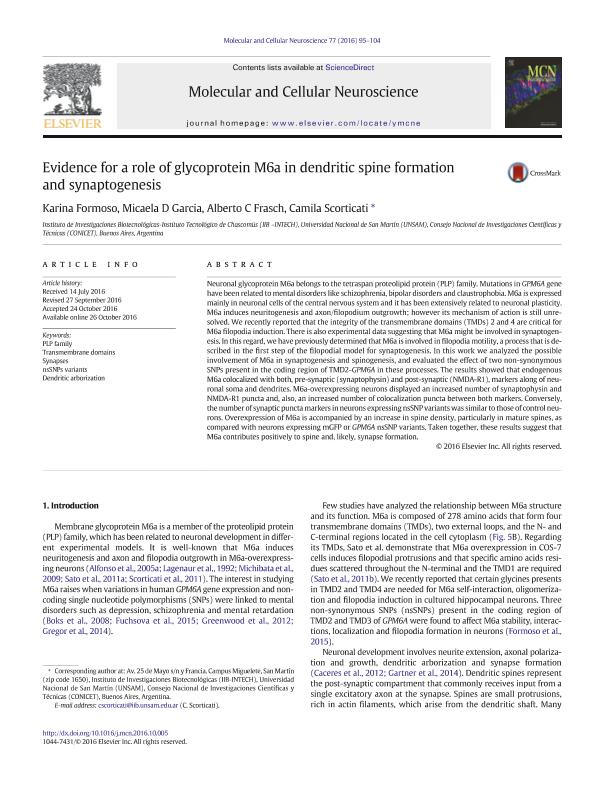Artículo
Evidence for a role of glycoprotein M6a in dendritic spine formation and synaptogenesis
Fecha de publicación:
12/2016
Editorial:
Academic Press Inc Elsevier Science
Revista:
Molecular and Cellular Neuroscience
ISSN:
1044-7431
Idioma:
Inglés
Tipo de recurso:
Artículo publicado
Clasificación temática:
Resumen
Neuronal glycoprotein M6a belongs to the tetraspan proteolipid protein (PLP) family. Mutations in GPM6A gene have been related to mental disorders like schizophrenia, bipolar disorders and claustrophobia. M6a is expressed mainly in neuronal cells of the central nervous system and it has been extensively related to neuronal plasticity. M6a induces neuritogenesis and axon/filopodium outgrowth; however its mechanism of action is still unresolved. We recently reported that the integrity of the transmembrane domains (TMDs) 2 and 4 are critical for M6a filopodia induction. There is also experimental data suggesting that M6a might be involved in synaptogenesis. In this regard, we have previously determined that M6a is involved in filopodia motility, a process that is described in the first step of the filopodial model for synaptogenesis. In this work we analyzed the possible involvement of M6a in synaptogenesis and spinogenesis, and evaluated the effect of two non-synonymous SNPs present in the coding region of TMD2-GPM6A in these processes. The results showed that endogenous M6a colocalized with both, pre-synaptic (synaptophysin) and post-synaptic (NMDA-R1), markers along of neuronal soma and dendrites. M6a-overexpressing neurons displayed an increased number of synaptophysin and NMDA-R1 puncta and, also, an increased number of colocalization puncta between both markers. Conversely, the number of synaptic puncta markers in neurons expressing nsSNP variants was similar to those of control neurons. Overexpression of M6a is accompanied by an increase in spine density, particularly in mature spines, as compared with neurons expressing mGFP or GPM6A nsSNP variants. Taken together, these results suggest that M6a contributes positively to spine and, likely, synapse formation.
Archivos asociados
Licencia
Identificadores
Colecciones
Articulos(IIB-INTECH)
Articulos de INST.DE INVEST.BIOTECNOLOGICAS - INSTITUTO TECNOLOGICO CHASCOMUS
Articulos de INST.DE INVEST.BIOTECNOLOGICAS - INSTITUTO TECNOLOGICO CHASCOMUS
Citación
Formoso, Karina; Garcia, Micaela Daiana; Frasch, Alberto Carlos C.; Scorticati, Camila; Evidence for a role of glycoprotein M6a in dendritic spine formation and synaptogenesis; Academic Press Inc Elsevier Science; Molecular and Cellular Neuroscience; 77; 12-2016; 95-104
Compartir
Altmétricas




